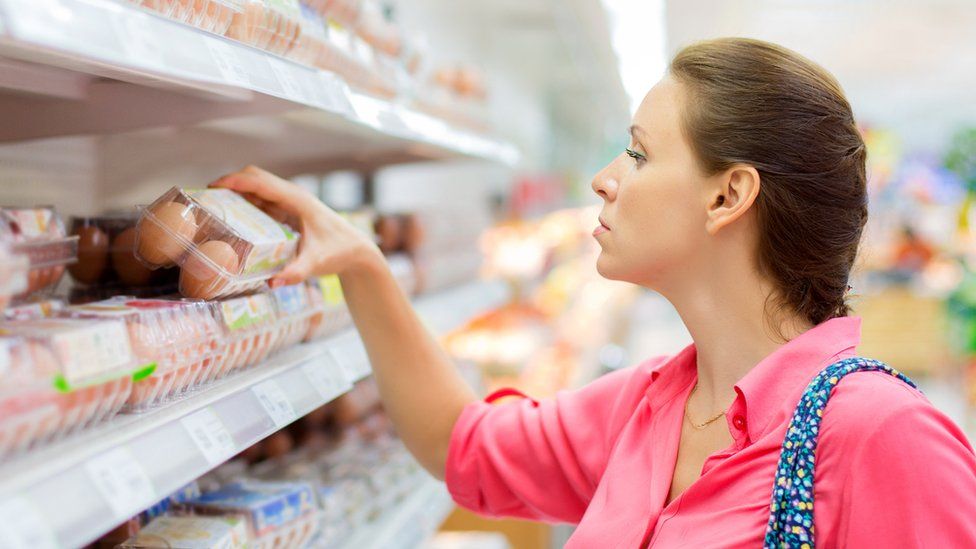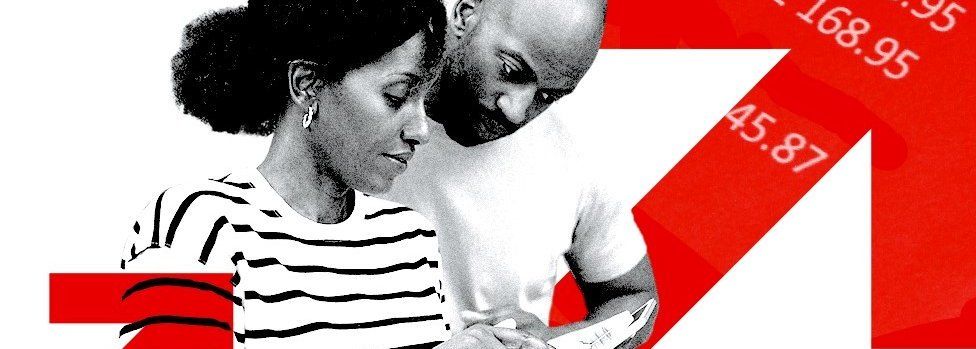Rising prices put more pressure on household finances, with one in four shoppers struggling, research finds.
 Image source, Getty Images
Image source, Getty ImagesRising milk, egg and margarine prices have contributed to a record increase in the cost of food and drink in shops, research suggests.
Grocery prices in the four weeks to 19 February rose 17.1% from a year ago, research firm Kantar said, the highest rate since its records began in 2008.
Kantar said one in four shoppers were now struggling financially.
It added that households faced an £811 increase to their annual grocery bill if they did not change shopping habits.
Food prices began to surge last year when the war in Ukraine triggered a huge rise in energy costs and disrupted supplies of grains, vegetable oils and fertiliser.
Fraser McKevitt, head of retail and consumer insight at Kantar, said the company’s research had found that grocery price inflation was “the second most important financial issue for the public behind energy costs”.
The latest price data was “disappointing”, he told the BBC. “There was hope at the beginning of this year that inflation in food and drink was going to start falling but it seems to have kicked up again and that’s before the latest news about shortages in fruit, veg and salads.
“We’re hoping that price inflation will start moderating this year… but that doesn’t mean that prices will fall, it just means they won’t be going up quite so quickly,” he added.
Kantar said that shoppers were continuing to favour supermarket own-brands in an attempt to save money.
Sales of own-brand goods were up 13.2% in February, compared with a 4.6% rise in branded goods.
Research carried out by the BBC found that some basic goods have nearly doubled in price over the past two years. For example, a standard 500g bag of pasta that cost 50p two years ago is now priced at 95p.
The research found that the cost of a small basket of 15 everyday essentials has gone up by £5.34 – from £15.79 in 2021 to £21.13 in 2023.

Tackling It Together


Commenting on the recent limits that supermarkets have been placing on fruit and vegetable sales, Mr McKevitt said: “While 43% of all grocery baskets contain at least one fresh produce item, pack limits are unlikely to drastically affect consumers as we usually buy fruit and veg in smaller quantities.
“For instance, only 1% of tomato purchases last year involved more than three packs.”
The discount supermarket chains have continued to see rapid growth, Kantar said, with both Aldi and Lidl seeing their sales grow by more than a quarter over the past year.
Kantar also said that online retailer Ocado had put in a “strong performance”, bucking a downward trend in online sales.
The figures from Kantar came as Ocado reported full-year results. These showed that the average number of items bought per visit fell from 52 in 2021 to 46 last year, although this was the same amount as before the pandemic. Online grocery shopping saw a huge rise during the pandemic as people sought to avoid travelling to stores.
Ocado chief executive Tim Steiner said: “Ocado Retail, our UK joint venture with M&S, has shown its resilience against a backdrop of higher costs and smaller baskets, reflecting the Covid unwind and the UK cost-of-living crisis, by growing customer numbers and increasing online market share.”
However, the Ocado Group reported a worse-than-expected loss of £500.8m for 2022, compared with a £176.9m deficit the year before.
Ocado announced it would be stepping up the supermarket price war from Wednesday by comparing prices with more than 10,000 like-for-like products on Tesco’s website. It will give customers money off their next shop if the cost of their goods would have been cheaper at Tesco.
All of the main supermarkets are competing fiercely amid the cost of living crisis, either through cutting prices or by pledging not to charge more than a rival.

How are you coping with the rising cost of living? Are you changing your shopping habits? Share your experiences by emailing haveyoursay@bbc.co.uk.
Please include a contact number if you are willing to speak to a BBC journalist. You can also get in touch in the following ways:
- WhatsApp: +44 7756 165803
- Tweet: @BBC_HaveYourSay
- Upload pictures or video
- Please read our terms & conditions and privacy policy
If you are reading this page and can’t see the form you will need to visit the mobile version of the BBC website to submit your question or comment or you can email us at HaveYourSay@bbc.co.uk. Please include your name, age and location with any submission.